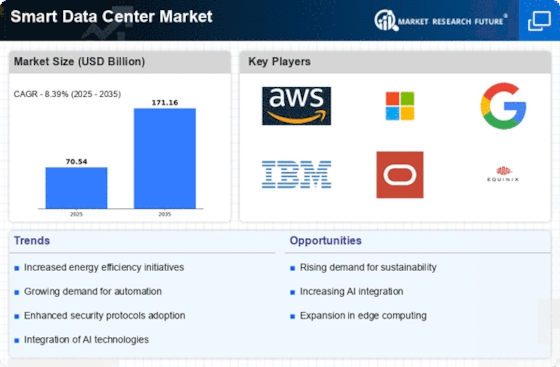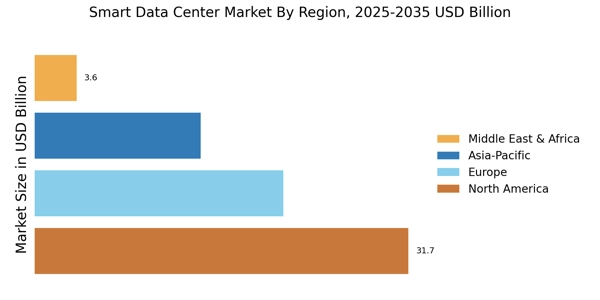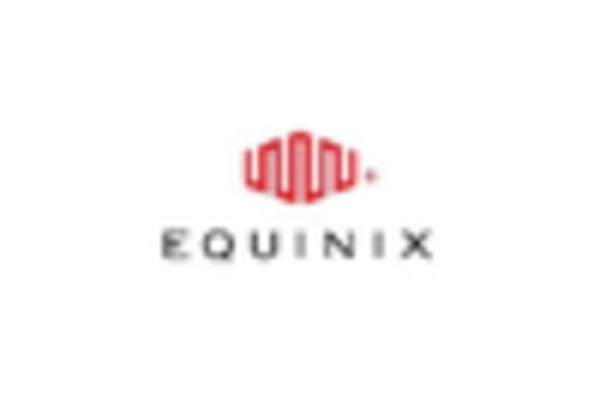Rising Demand for Data Processing
The Smart Data Center Market is experiencing a notable surge in demand for data processing capabilities. As organizations increasingly rely on data-driven decision-making, the need for efficient data management solutions becomes paramount. This trend is reflected in the projected growth of the data center market, which is expected to reach a valuation of approximately 200 billion dollars by 2026. The proliferation of big data analytics and the Internet of Things (IoT) further amplify this demand, necessitating advanced infrastructure that smart data centers provide. Consequently, businesses are investing in smart data centers to enhance their operational efficiency and scalability, thereby driving the market forward.
Energy Efficiency and Cost Reduction
Energy efficiency remains a critical driver in the Smart Data Center Market. With energy costs constituting a significant portion of operational expenses, organizations are increasingly seeking solutions that minimize energy consumption. Smart data centers utilize advanced cooling technologies and energy management systems to optimize power usage. Reports indicate that energy-efficient data centers can reduce energy costs by up to 30%. This not only leads to substantial cost savings but also aligns with corporate sustainability goals. As energy regulations become more stringent, the adoption of smart data centers is likely to accelerate, further propelling market growth.
Adoption of Cloud Computing Solutions
The Smart Data Center Market is significantly influenced by the widespread adoption of cloud computing solutions. As businesses transition to cloud-based services, the demand for data centers that can support these technologies intensifies. The cloud computing market is projected to grow at a compound annual growth rate of over 20%, indicating a robust need for smart data centers that can accommodate this shift. These facilities offer the scalability and flexibility required for cloud services, enabling organizations to enhance their IT infrastructure. Consequently, the integration of cloud computing with smart data centers is likely to drive innovation and efficiency in the market.
Regulatory Compliance and Data Security
Regulatory compliance and data security are paramount concerns for organizations, thus driving the Smart Data Center Market. As data breaches and cyber threats become increasingly prevalent, businesses are compelled to invest in secure data center solutions. Smart data centers incorporate advanced security measures, including encryption and access controls, to safeguard sensitive information. Furthermore, compliance with regulations such as GDPR and HIPAA necessitates robust data management practices. The market for data center security solutions is expected to grow significantly, reflecting the urgent need for organizations to protect their data assets. This focus on security is likely to enhance the attractiveness of smart data centers.
Technological Advancements in Infrastructure
Technological advancements in infrastructure are a key driver of the Smart Data Center Market. Innovations such as artificial intelligence, machine learning, and edge computing are transforming how data centers operate. These technologies enable predictive maintenance, automated resource allocation, and enhanced performance monitoring, leading to improved operational efficiency. The integration of AI in data center management is projected to reduce operational costs by up to 25%. As organizations seek to leverage these advancements, the demand for smart data centers that can support cutting-edge technologies is expected to rise. This trend indicates a promising future for the smart data center market.

















